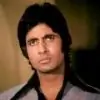My God, That's My Tune"
An Interview with R D Burman
By V. S. Gopalakrishnan & Meera Pandya
Published in the June 16-30, 1984 issue of Filmfare
====================================================
WHENEVER an Indian achieves a milestone abroad, he instantly gets
More recognition in his own country. Perhaps it's the colonial
Hangover that still makes us believe that they are always right over
There. In this case however, the distinction is not going to make any
Difference as the person gaining it is already a household name here.
Rahul Dev Burman, who has given music for 225 Hindi films, has made
It to the New York hit parade with a song titled in every city. He is
All set to launch the album—'Pantera'—in India. Two people have been
Responsible for getting him there—his father Sachin Dev Burman who
Was the only member of the family willing to let him enter films, and
Pete Gavankar, a friend of thirty years who goaded him into seeking
New pastures and has financed the album.
Intrigued, we decided to find out just how the international album
Had come about and while we were at it, also gauge just how much R.D.
Had already packed into his life of 45 years. It turned out to be
Much more than we had thought as we had to have several sittings
Before we were through. But R.D. was patience itself. His partner
Sapan Chakraborty was there to help out R.D. who whenever he got
Stuck scratched his forehead and asked, Woh kaunsa gana thai or an
Occasional Qui bolche? We also met Pete Gavankar.
Pantera began when R. D. and Asha Bhosle met Pete and his wife in Las
Vegas in 1975. Pete, a micro-chip genius who's made millions after
Migrating to America 25 years ago, told Pancham (as R. D. is known to
All and sundry) that he had to move out of India to progress. R. D.
Hesitated. Making a record in America is a long process—anything from
Three to four months.
According to R.D., "Pete was really excited about it all. He said
He'd arrange the whole thing. Anyway Pete had said, even if the
Record flopped, it was his money."
Finally when Pete visited India in 1980-81 he took 15 tunes from R.
D. They had taken him just seven days to compose. Pete handed over
The cassettes to his sister Nilu, who knew many pop groups in San
Francisco and she in turn played them for Jose Flores, an up-and-
Coming musician. Jose liked five numbers, mixed them with Latin-
American music and recorded them. The result? "It sounded terrific,"
Says R.D. "It wasn't even a professional recording, just done in a
Hall, yet it sounded good."
After listening to the cassette Pete had sent him, R.D. decided to go
To San Francisco and record the songs. The day after Pancham landed
In San Francisco was carnival day, May 15. The atmosphere inspired
Him; he composed the "carnival" number on the album then and there.
Later that evening they visited a disco where R.D. and Jose's joint
Number In every city was played.
An excited R.D. related what passed: "The number began with a bang,
New York City, Chicago, LA, San Francisco and Bombay. All the people
There started dancing. At the climax all were clapping. I was so
Moved I almost cried."
"At a get-together later Pete asked how long it would take to brush
Up the whole thing," R.D. went on. "I said about four days. For the
Sound mixing Pete managed to wangle the services of Patrick Gleason,
A master synthesizer who worked with Francis Ford Coppola
On 'Apocalypse Now". They also used Gleason's studio which has the
Most sophisticated equipment.
"Gleason uses a digital synthesizer which can create any sound,
Including animal calls. For the Pantera number we tried to get the
Actual sound from the zoo but as the recording wasn't satisfactory we
Finally had the synthesizer produces the sound—and it's perfect. To
Gleason's astonishment we cut the album comprising six songs in a
Marathon ten days."
For this new album of Latin-American-Indian music only raw talent was
Chosen. All the artistes were budding youngsters, the vocalists were
Even from different backgrounds, a Japanese, a Puerto-Rican and a
Negro. Pete was euphoric about the cooperation and wonderful team-
Work they experienced.
"There was such complete synchronization," Pete says. "Even as a
Producer, I wasn't there just to provide the money. It was sheer team-
Work that made us a success. We worked out a strategy and we've made
It big." How else could R.D.Burman and Jose Flores have featured on?
The same radio programme as Paul McCartney, Michael Jackson and Lynda
Ronstadt?
The late S. D. Burman had first realised his son was musically
Inclined when he heard him play the harmonica at a school function.
Obviously 'Dada', as the industry knew him, was ignorant of his son's
Achievements since him himself stayed at Bombay and Pancham at
Calcutta.
Prior to this, R.D. had been to Bombay for a short period. There they
First stayed in a Borivli chawl and later shifted to a one-room home
Which the Burmans shared with Harindranath Chattopadhyaya's family.
Realizing how hard up Dada was, R. D.'s grandmother whisked him back
To Calcutta saying she'd bring him up. On one of his visits to
Calcutta, Dada was made the chief guest at a school sports function.
He even handed over a prize to Pancham for cycling. R.D. positively
Blushed while relating this incident.
The same evening Dada discovered his son's talent. "The next morning
My father asked me how long I'd been practicing and what my aim was.
I replied that I'd been having a go for the past eight months and
Wanted to be a better music director than he. My answer must have
Surprised him."
Dada set about the task of moulding his son. First he put Pancham
Under tabla maestro Brajen Biswas who taught him the basics of rhythm
And after that under Ali Akbar Khan and later Ashish Khan to learn
The sarod.
"This was around 1950-51. My father explained that before you compose
You must know the range of the instruments at your command to get the
Best out of them. I spent over four years with that family and learnt
The basics of classical music from them. Even today when I work on a
Film that has a classical base ('Kinara') I am subconsciously
Influenced by that period in my life.
"I was very bad in studies and my grandmother used to complain
Constantly. My father was in Calcutta one day when he made the
Decision to take me to Bombay. My grandmother objected saying the
Industry would be a bad influence on me. Father however was adamant.
He said, 'My son is not a good student, I am getting old, I must take
Him to Bombay and groom him. In ten years I may be able to make
Something of him.' A quarrel ensued and father left Calcutta. Before
Leaving he asked me if I'd composed anything. I played the 15 tunes I
Had ready.
"A year later, while watching the film 'Funtoosh' I suddenly heard
One of the tunes I'd composed. I blurted out aloud—'My God, that's my
Tune'. I wrote and accused my father of flicking my tune and he
Admitted he had." The song was Ae meri topi palat ke aa—a big hit in
Its time.
Courtesy: Pete Gavankar & Salim Shah

























